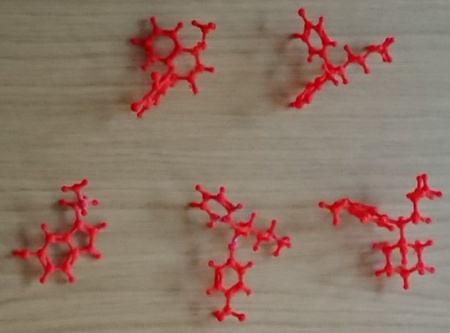3D printing to develop molecular understanding, drug design experience and public engagement skills
As the programme coordinator for the clinical pharmacology and drug discovery programmes, I am always looking for ways to enhance the teaching and learning experience we offer as part of our postgraduate programmes. Not only does this keep the material covered fresh and relevant, but it means we can continually develop our practices in order to deliver understanding and enjoyment effectively to our students. In such a dynamic and advancing field, it is also critical that we continually advance our teaching and engage with new technologies and developments.
Through involvement across the wider pharmacological community and in particular through the British Pharmacological Society (BPS), sharing of best practice and experiences helps to drive changes and improvements in our programme. In addition, the BPS also provide information about the recommended curricular contents of pharmacology and related programmes. One theme that is currently important is developing public engagement and outreach skills amongst students to help enhance communication with the public and to increase societal awareness of the discipline. In addition, throughout our programme there is emphasis on drug discovery, drug design and molecular interactions of drugs with targets, and in this there was an opportunity to develop an exercise that integrated these with public engagement. In designing this exercise, 3D printing was a central feature as it brings the molecular structures to life and enhances visualisation of the interactions that occur. In addition, it engages students with this advancing technology and links to the various structural databases and molecular modelling programmes that are becoming ever more prevalent in the modern molecular age.
The 3D printing class project involves students selecting a therapeutically relevant drug target and some drugs which interact with it and then printing out their molecular structures in 3D. Students will then use these molecules (and their imaginations) to make videos explaining the ways in which drug molecules interact with the target and why this results in treatment of a disease or condition. In addition, students will then develop a new drug structure with specific structural characteristics that influence its clinical activity, demonstrating their understanding of the importance of molecular structure in pharmacological function. This new approach will link areas of molecular understanding, and 3D interactions in the context of drug design and development. This will also provide exposure to 3D modelling software and structural databases that store these structures, highlighting skills around use of big data and validating source accuracy. Students will also gain transferable skills such as group work, video creation and pubic engagement given that some of the assessed pieces of work will be targeted to a lay audience. This will ensure that the level of understanding achieved is such that students will be able to deconstruct mechanisms of action and explain them in an engaging and simple way. Whilst this is a difficult skill, it benefits the students in developing their own understanding, significantly impacts their public engagement and communication skills and also provides potentially new ideas for events aimed at outreach.
Overall, this new exercise is aimed to engage students with technologies and allow skills development across a range of fundamental components associated with clinical pharmacology and drug discovery, and also across other key interpersonal areas. In future blogs, I will explore other areas of activity in developing the teaching and learning approaches in the clinical pharmacology and drug discovery areas.


